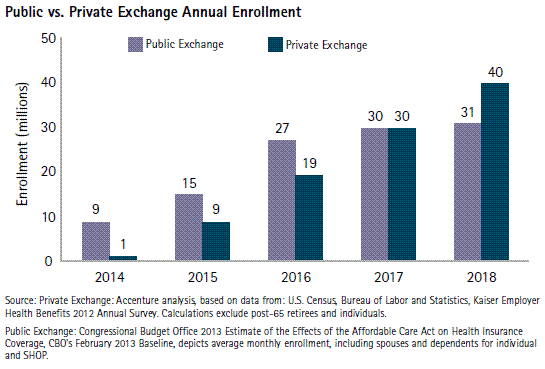Are You Ready? Private
Health Insurance
Exchanges Are Looming
Accenture Research shows: By 2017,
nearly 1 in 5 Americans will purchase
benefits from a health insurance
exchange, yet consumers are unaware
and ill prepared
June 13, 2013 - Accenture
Considerable attention has been paid to the
state health insurance (public) exchanges
created by the Patient Protection and
Affordable Care Act. These public exchanges
will expand and standardize coverage for an
estimated 30 million individuals by 2017.
However, this transformation is also paving
the way for the rapid growth of another
quietly emerging channel. Private health
insurance exchanges have been incubating
for several years, but the accelerated
development of exchange products and
technologies has employers increasingly
re-evaluating traditional employee benefits.
Private health insurance exchanges will
rapidly upend insurance purchasing for
many of the 170 million people who receive
benefits through their employer. According
to Accenture research, private exchange
participation will approach public exchange
enrollment levels as soon as 2017 and
surpass them soon thereafter. The result:
In 2017 approximately 18 percent of the
American public will purchase insurance
through exchanges, radically transforming
the health insurance landscape.
Private exchanges facilitate employers?f
move to a defined contribution funding
strategy to better manage future cost
trends and offer employees greater choice,
flexibility and a retail-like shopping
experience. While the market has remained
fairly nascent with fewer than one million
enrollees in 2012, employers are expressing
tremendous interest. Recent employer
surveys indicate that more than 1 in 4
employers are considering moving to a
private exchange in the next three to five
years. Correspondingly, several benefits
consultancies.Aon Hewitt, Buck Consultants,
Mercer, Towers Watson.and a number of
health plans are launching private exchanges
to meet this expected demand.

Let the buyer beware
While private exchanges may be top
of mind for employers, employees are
largely unaware of this emerging model.
According to a recent Accenture survey
of 2,000 US consumers, 83 percent of
consumers are entirely unfamiliar with the
private exchange concept. A similar lack of
awareness exists about public exchanges.
This lack of awareness is pervasive across all
demographic categories.
Widespread employer interest paired with
markedly low consumer awareness suggests
there may be material, latent demand for
the private exchange model. Accenture
research revealed that once presented with
the concept, 85 percent of those surveyed
expressed a neutral to positive outlook.
Respondents are attracted to choice,
flexibility, the personalized product selection
and the shopping experience. In fact, the
majority of respondents are even willing to
share personal information about themselves
and their families to receive personalized
recommendations through the platform.
This latent employee demand will further
accelerate private exchange adoption.
Private exchange providers have been
largely focused on educating employers of
the concept?fs benefits. However, private
exchanges will shift considerable financial
responsibility to employees, expanding
choice yet requiring users to become
superior individual risk managers. This
creates tremendous opportunity for carriers,
brokers and employers to take credit for an
enhanced experience, yet also creates equally
tremendous risk as dissatisfied consumers
will blame plan sponsors. The majority
of survey respondents remain wary that
firms are merely looking to shift costs to
employees.a notion that employers should
quickly work to dispel.
Rapidly expanding private exchanges will
increasingly enter c-suite conversations.
Adoption has accelerated substantially, and
will continue to do so as public and private
exchanges demonstrate legitimacy and early
vendors mature their offerings. However,
this velocity of change will surprise a largely
unaware consumer population. This may
result in negative consequences for those
who lack the education, support, and tools
required to effectively manage increased
responsibility for personal health care risk.
Effectively addressing this latent demand
and supporting consumer success are critical
success factors for aspiring market leaders.
For more information, contact:
Richard Birhanzel
richard.f.birhanzel@accenture.com
Scott Brown
j.scott.brown@accenture.com
Joshua Tauber
joshua.tauber@accenture.com
Methodology
Accenture conducted an online survey of 2,000
consumers in the United States. The survey assessed
consumers between the ages of 18 and 64 who
receive health insurance through their employer or
other affiliation, their significant other, or individually.
The research was conducted in March 2013.
Copyright c 2013 Accenture
All rights reserved.